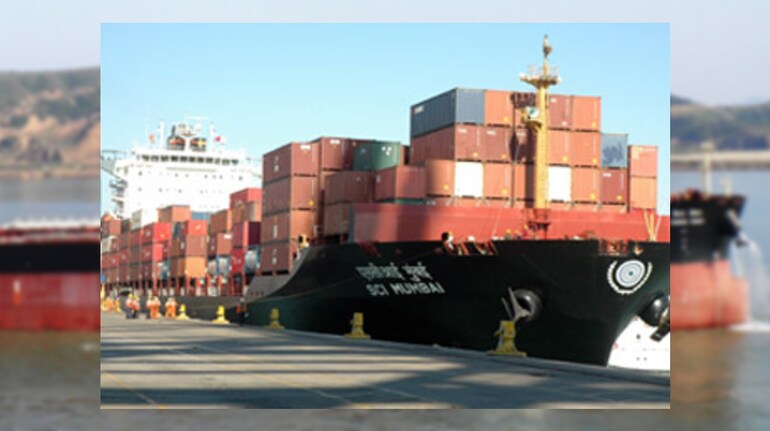



New Delhi's ban on Pakistan-origin cargo passing through its ports from May 2 is expected to create delays in consignments reaching Pakistan, as shipping lines will be forced to come up with alternative routes when delivering consignments to India and Pakistan, industry insiders and market experts told Moneycontrol.
"Shipping lines usually serve the ports of Karachi and Mumbai as part of the same service. Following the Indian government's move to restrict all cargo origination from Pakistan or being delivered to Pakistan, even if remaining on board, shipping lines are being forced to offload said cargo before being allowed to dock at Indian ports," a senior executive from a Mumbai-based shipping line told Moneycontrol.
He added that shipping lines are exploring changes to their delivery services to cater to cargo originating from Pakistan or to be delivered to Pakistan. It may be combined with cargo meant for ports in West Asia, which is likely to delay delivery of shipments meant for Pakistani traders by a day.
The move left carriers with little choice but to avoid calling at ports like Port Qasim in Karachi on westbound sailings, mostly for trades to the US and Europe, and search for alternatives to connect Pakistan trade.
Two-way trade between India and Pakistan has historically been negligible, but third-country freight remaining in Indian networks became a victim of the diplomatic face-off, despite there being no restrictions from either side on foreign-flagged vessels plying their respective territorial waters.
Connor Helm, ocean procurement manager, Indian subcontinent and Middle East at Flexport, said that while shipping lines have so far not notified changes in their long-distance cargo delivery services, automatic identification system (AIS) tracking of US East Coast services like Hapag-Lloyd’s TPI and CMA-CGM’s INDAMEX reveal service changes.
"These services typically call at Port Qasim, Pakistan, before Nhava Sheva and Mundra, India. Hapag-Lloyd’s Nagoya Express (a Liberia-flagged container ship), after calling at Port Qasim on May 1, was due in Nhava Sheva on May 3 but diverted south to Colombo, Sri Lanka, likely to tranship Pakistani cargo to AA7 or US4 services for the U.S. East Coast," Helm said. CMA-CGM’s CMA CGM Bianca carrier after visiting Pakistan turned back mid-voyage on May 1 to offload cargo loaded in Pakistan before resuming its route to Nhava Sheva and Mundra, he said.
"Carriers will likely reshuffle their Pakistan direct calls and move to a transhipment routing from an alternative Middle East port or Sri Lanka," Helm added.
Maersk also said it was making every effort to fix supply chain gaps the disruption might cause for customers. "We have established dedicated response teams to assess the full impact of these developments and provide tailored guidance to customers whose supply chains are affected," the shipping line said in a statement on May 5.
Given that a near-term restoration of normal trade ties between India and Pakistan seems unlikely, it remains to be seen if carriers serving Indian trades will reorganise their network rotations to include additional calls at Colombo or Jebel Ali, in Dubai.
While regional transhipment options could help alleviate the pain, the latest disruption is not good news for supply chain stakeholders and cargo owners already having to navigate the lingering Red Sea-linked challenges.
The crisis has hit the air sector too, with major airlines avoiding flying over Pakistan owing to the tension with India. Air France and Lufthansa have both said they would avoid Pakistani airspace, while other major carriers also appear to be diverting. Both India and Pakistan have closed their airspace to each other's carriers, leading to higher costs and lengthier flights.
A provision in this regard has been added in Foreign Trade Policy (FTP) 2023 “to prohibit direct or indirect import or transit of all goods originating in or exported from Pakistan with immediate effect until further orders”, the Directorate General of Foreign Trade (DGFT) said in a notification dated May 2.
Inserting the provision under the heading “Prohibition on Import from Pakistan” in the FTP, it said: “Direct or indirect import or transit of all goods originating in or exported from Pakistan, whether or not freely importable or otherwise permitted, shall be prohibited with immediate effect, until further orders.”
It added that this restriction was imposed in the interest of national security and public policy. Any exception to this prohibition will require the government's approval.
Following India's move, Pakistan also decided to close its shipping ports for Indian flag carriers, a statement from the country’s maritime affairs ministry said, as Islamabad’s tensions with New Delhi continue to surge following a deadly attack on tourists in Kashmir. The move came hours after India announced it had banned the import of goods coming from or transiting via Pakistan and barred Pakistani ships.
Both nations have taken a raft of measures against each other since April 22, when gunmen killed 26 tourists in Pahalgam. New Delhi pinned the blame on Islamabad, an accusation that Pakistan has vehemently denied.
Discover the latest Business News, Sensex, and Nifty updates. Obtain Personal Finance insights, tax queries, and expert opinions on Moneycontrol or download the Moneycontrol App to stay updated!
Find the best of Al News in one place, specially curated for you every weekend.
Stay on top of the latest tech trends and biggest startup news.